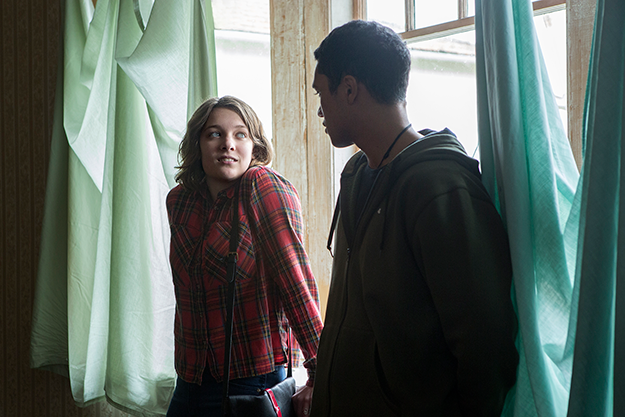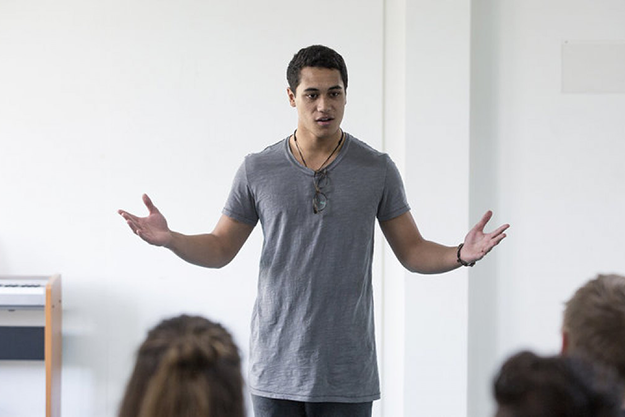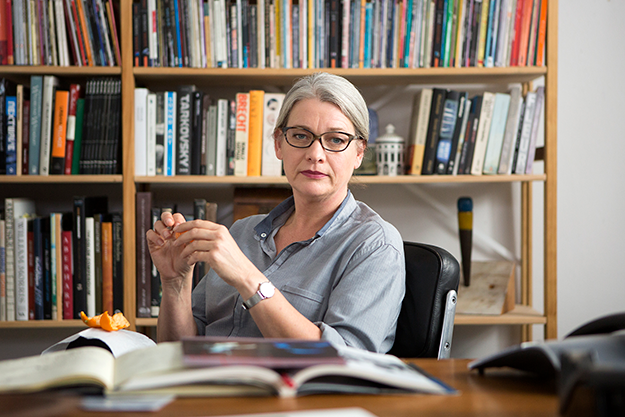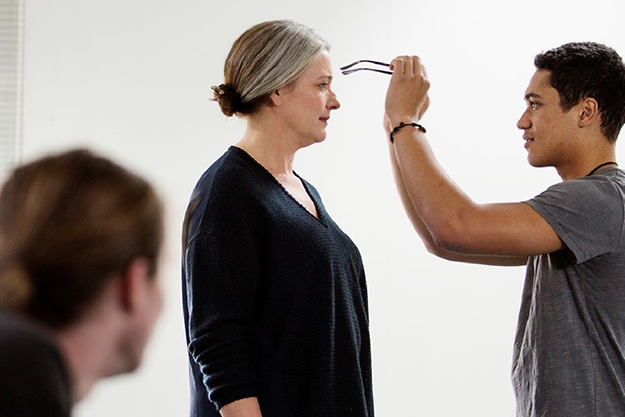Film of the Week: The Rehearsal

Some viewers get suspicious when presented with movies about cinema. That’s only understandable: little is more off-putting, if you don’t have a taste for the self-reflexive, than films that contain introspective, fourth-wall-breaking mirror play that pushes you back out of the movie that you’re trying to feel immersed in. We all know, then, how much more uncomfortable it can be when you’re watching films about theater—and, even worse, about theater people and their processes of preparation. It’s often taken as read by cinema people that at some point in your cultural development you make a choice between theater and film, between live performance and an experience that has a crucial dimension of distantiation and deferral built in. Very few film directors—Jacques Rivette most notably—have consistently attempted to bridge this gap, to map the ways in which film and theater overlap or even come to occupy the same space.
So if you’re averse to theater films, prepare to feel extremely uncomfortable when watching the New Zealand drama The Rehearsal—although the multiple shades of unease, both the audience’s and the characters’, evoked by this film are very much built into the whole. The director is Alison Maclean, who scored a striking debut with her 1992 piece about desire and trauma, Crush, then made an eerie, imagistic adaptation of Denis Johnson’s novel Jesus’ Son (1999). Since then, apart from a 2004 documentary co-directed with Tobias Perse, Persons of Interest, she has largely worked in TV (Sex and the City, The L-Word, The Tudors, Gossip Girl). It’s good to see her returning to feature fiction, and to a New Zealand setting, with this version of Eleanor Catton’s 2008 novel, adapted by Maclean and novelist Emily Perkins.
From the start, we know this is going to be a “theater-is-hell” movie in, perhaps, a teasing way—photos of young people are leafed through, sorted, and commented on by a group of adults, their voices heard offscreen. They are drama-school teachers selecting applicants for a new intake, and from their lofty, sometimes tart comments, it’s clear that the kids are in for a rough time. That’s confirmed when we see the novices gathered for an opening address from the school’s head Hannah (Kerry Fox). Giving them a coolly challenging, appraising glare through her glasses, she warns them of the “violence” ahead, then asks them if they know how to “minimize the damage.” “Don’t fuck each other!” shouts out one joker—but that’s not, in fact, going to be the source of the carnage to come.

In line to get bruised repeatedly is Stanley (James Rolleston, seen in Taika Waititi’s Boy), handsome and muscular, with the sort of look that usually denotes alpha males in college movies—but in fact painfully shy and labeled somewhat derisively by Hannah as “virginal.” Stanley’s ordeal will be all about having his virginal defenses laid siege to. We see him struggling in a class exercise where he simply can’t say “I want you” to a female classmate with any sort of conviction. He can’t even get it up, dramatically speaking, when he’s told to imagine the girl is a chocolate bar. Maybe he doesn’t like chocolate that much. Or rather, maybe he just doesn’t sufficiently want; it becomes clear that in this establishment supreme value is placed on desire, hunger, relentless thrust. “You have to go all the way, all the time,” Hannah will insist. Meanwhile, until Stanley can muster or at least perform hunger, he’s doomed to take blow after blow. “Oh this is ridiculous,” sneers Hannah. “You’re a creep. A creepy creep creep.”
Even a kinder, gentler, New Agey sort of teacher—who later takes issue with Hannah’s reign-of-terror methods—lays into Stanley (“What are you, a pussy?”). But meanwhile he explores his desire in more tentative ways. He befriends a girl he meets on the way to school, and who seems as virginal as him—Isolde, played with beguiling opacity by Ella Edward. As the two draw cautiously closer, it turns out that Isolde is connected with a local scandal. A tennis-club coach, a middle-aged married man named Saladin (Erroll Shand) has been sacked for having sexual relations with her sister Victoria (Rachel Roberts), and Isolde is the one who has blown the whistle on the pair. Set to the task of devising an end-of-year performance—there are some wonderfully outré, arty ideas suggested, then nervously rejected—Stanley and a group of classmates decide that there’s material to be gleaned from Victoria’s experience and start studying the case. They will turn current real-life events into art—which is after all a fairly standard approach in contemporary theater, in forms such as verbatim theater that bring public and political affairs to life in reportage style. What’s particular here is that Stanley’s group is re-creating events while they’re still happening—and still affecting the lives of people they know.
Stanley’s big breakthrough, however—the one that perhaps allows him to become transgressive—comes when he at last reveals his talent for becoming someone else. His first attempt is painful: we see him walking along a street dressed stiffly in a suit, as if on his way to the office. He’s accosted by an older man, who says he’d like to walk with him. Stanley doesn’t say no—we assume because he’s too ineffectual to repel an advance, or maybe even because he’s interested. We then realize that he’s taking part in an acting exercise, embodying a character—“Mormon, gay, uptight”—from Tony Kushner’s play Angels in America. He totally fails to pull off the exercise to Hannah’s satisfaction, but then something clicks. After a lunch with his bullish, self-satisfied businessman father, Stanley starts playing his dad in class, donning a new assertive macho mask, flirting with Hannah and clearly finding the tender spots in her hard surface, professionally and sexually.

Maclean’s film astutely presents a number of such scenes of revelation and crucial confrontation. It’s an involving but not always entirely compelling film, partly because of its fragmentary structure—it’s arranged in chapters, month by month—and its sometimes tantalizing layering of subplots. There are a lot of counterpointed themes to contend with, in what often does very much feel like the adaptation of a complex novel (although I haven’t read Catton’s book). One subplot involves the private traumas of Stanley’s classmate and flatmate William (Kieran Charnock), who seems to have his act together—I use the term advisedly—although, perhaps predictably, this turns out not be the case. Another involves the relationship between Stanley and Isolde, and the way in which she uses her sister’s story to try to get to him. There’s a deliciously awkward, very finely judged scene between them in which she stresses that, despite general belief, Saladin didn’t force himself on Victoria. “She wanted it,” Isolde tells Stanley, and the way that she stresses “wanted” makes it very clear to us what she wants—though, perhaps, not quite clear enough to Stanley.
There’s also a thematic strand—centered around a certain TED talk—concerning leadership, following, and the matter of how it might take a strong individual to give others permission to follow—part of the film’s debate on how powerful, guru-like teaching intersects with destructive tyranny. This theme provides the film’s payoff—one that will either seem graceful or leave you grinding your teeth in frustration—as Stanley’s group realizes that if you can’t pull off a performance in the traditional sense, then performance art may just be the way to go.
Much of what is revealed about human behavior in The Rehearsal may well be “actory-wanky,” as Kerry Fox put it in a Film Comment interview. But much of it elegantly cuts to the quick. The diffuse nature of the narrative, the way in which the film sometimes seems reluctant to focus, makes it something other than the simpler, more direct, more obvious movie that it might have been—a spectacle of the pedagogic urge to destroy, the story of the ritual education by cleansing fire of a hapless apprentice. The Rehearsal is not, in other words, Whiplash for thespians. But what the film does in the Whiplash register, it does very well, and Fox’s Hannah—fluctuating between contemptuous rage and a dangerous form of matriarchal nurturing—is nuanced, terrifying, and often horribly funny.

Some of the student characters come across as elusive, diffident, even nebulous, but that’s partly the point: this cast captures the sense of tentativeness, suggested by the title, in young people who haven’t yet decided what role they intend to play in life. Rolleston is particularly good as a teen whose appearance, which ought to embody self-knowing confidence, simply conceals the uncertainty and atypically gentle form of masculinity.
The film is very cleanly edited and shot—Andrew Commis’s photography often feels somewhat formal, giving us the sense of watching from a distance events framed as if on a proscenium stage. The Rehearsal is sometimes frustrating in its refusal to connect as decisively as you want it too—but that contemplative complexity is what makes its distinctive flavor. The music, by NZ eccentric Connan Mockasin—detuned guitars and speeded-up child-like falsetto vocals—underlines the nervousness and innocent anxiety of its young characters.
Jonathan Romney is a contributing editor to Film Comment and writes its Film of the Week column. He is a member of the London Film Critics Circle.







